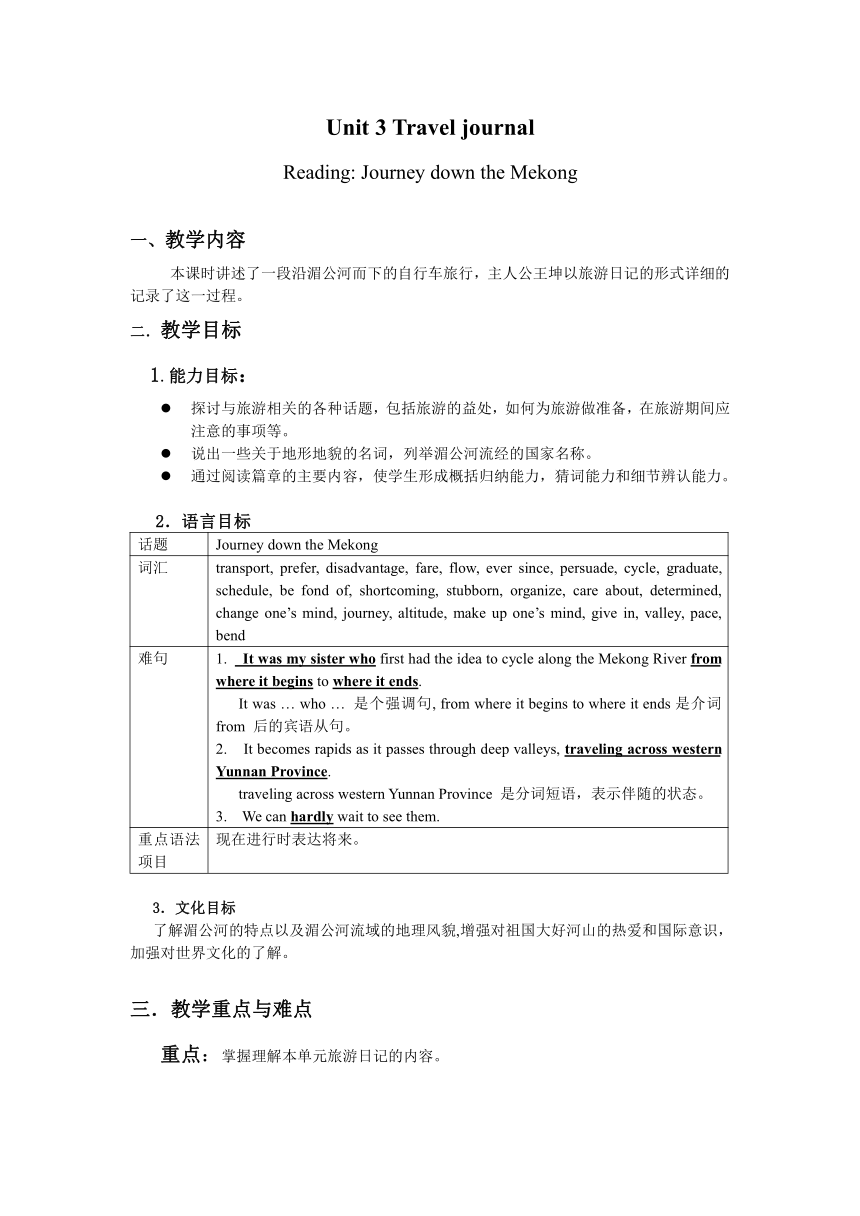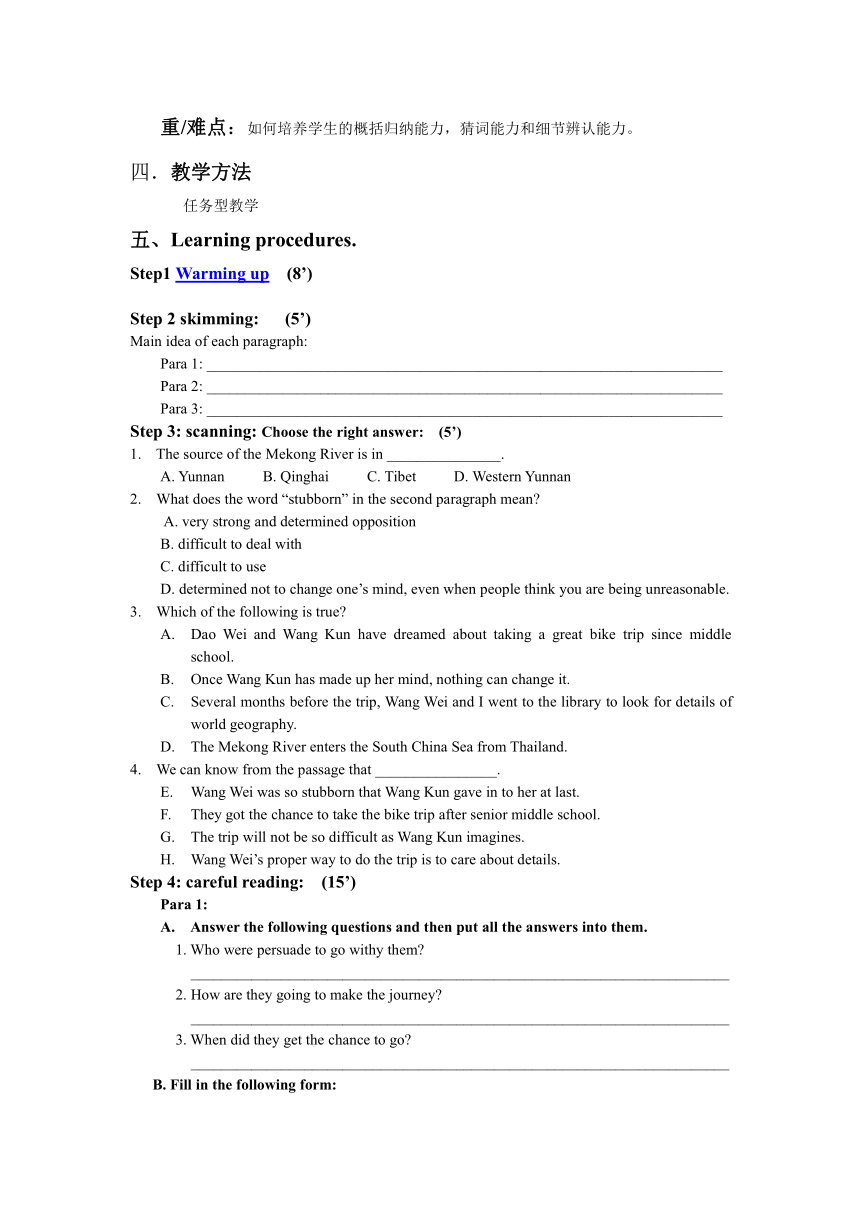unit3 Reading: Journey down the Mekong(吉林省吉林市龙潭区)
文档属性
| 名称 | unit3 Reading: Journey down the Mekong(吉林省吉林市龙潭区) |

|
|
| 格式 | rar | ||
| 文件大小 | 15.3KB | ||
| 资源类型 | 教案 | ||
| 版本资源 | 人教版(新课程标准) | ||
| 科目 | 英语 | ||
| 更新时间 | 2008-10-21 20:02:00 | ||
图片预览


文档简介
Unit 3 Travel journal
Reading: Journey down the Mekong
一、教学内容
本课时讲述了一段沿湄公河而下的自行车旅行,主人公王坤以旅游日记的形式详细的记录了这一过程。
二.教学目标
1.能力目标:
探讨与旅游相关的各种话题,包括旅游的益处,如何为旅游做准备,在旅游期间应注意的事项等。
说出一些关于地形地貌的名词,列举湄公河流经的国家名称。
通过阅读篇章的主要内容,使学生形成概括归纳能力,猜词能力和细节辨认能力。
2.语言目标
话题 Journey down the Mekong
词汇 transport, prefer, disadvantage, fare, flow, ever since, persuade, cycle, graduate, schedule, be fond of, shortcoming, stubborn, organize, care about, determined, change one’s mind, journey, altitude, make up one’s mind, give in, valley, pace, bend
难句 1. It was my sister who first had the idea to cycle along the Mekong River from where it begins to where it ends. It was … who … 是个强调句, from where it begins to where it ends是介词from 后的宾语从句。2. It becomes rapids as it passes through deep valleys, traveling across western Yunnan Province. traveling across western Yunnan Province 是分词短语,表示伴随的状态。3. We can hardly wait to see them.
重点语法项目 现在进行时表达将来。
3.文化目标
了解湄公河的特点以及湄公河流域的地理风貌,增强对祖国大好河山的热爱和国际意识,加强对世界文化的了解。
三.教学重点与难点
重点:掌握理解本单元旅游日记的内容。
重/难点:如何培养学生的概括归纳能力,猜词能力和细节辨认能力。
四.教学方法
任务型教学
五、Learning procedures.
Step1 Warming up ( .. / 演示文稿1.ppt ) (8’)
Step 2 skimming: (5’)
Main idea of each paragraph:
Para 1: ____________________________________________________________________
Para 2: ____________________________________________________________________
Para 3: ____________________________________________________________________
Step 3: scanning: Choose the right answer: (5’)
1. The source of the Mekong River is in _______________.
A. Yunnan B. Qinghai C. Tibet D. Western Yunnan
2. What does the word “stubborn” in the second paragraph mean
A. very strong and determined opposition
B. difficult to deal with
C. difficult to use
D. determined not to change one’s mind, even when people think you are being unreasonable.
3. Which of the following is true
A. Dao Wei and Wang Kun have dreamed about taking a great bike trip since middle school.
B. Once Wang Kun has made up her mind, nothing can change it.
C. Several months before the trip, Wang Wei and I went to the library to look for details of world geography.
D. The Mekong River enters the South China Sea from Thailand.
4. We can know from the passage that ________________.
E. Wang Wei was so stubborn that Wang Kun gave in to her at last.
F. They got the chance to take the bike trip after senior middle school.
G. The trip will not be so difficult as Wang Kun imagines.
H. Wang Wei’s proper way to do the trip is to care about details.
Step 4: careful reading: (15’)
Para 1:
A. Answer the following questions and then put all the answers into them.
1. Who were persuade to go withy them
_______________________________________________________________________
2. How are they going to make the journey
_______________________________________________________________________
3. When did they get the chance to go
_______________________________________________________________________
B. Fill in the following form:
Characters
Relationship
Their dream
Para 2
A. Finish the following form
Wang kun Wang Wei
Map Should look at Of course, she hadn’t
Source Too far A determined look; change her mind
Altitude Too high Be excited about
air Be hard to breathe ;cold An interesting experience
B. use some adjectives to describe each character of Wang Kun and Wang Wei.
C. Sentence translation:
1. Although she didn’t know the best way of getting to places, she insisted that she organize the trip properly.
_______________________________________________________________________
2. She gave me a determined look – the kind that said she would not change her mind.
_______________________________________________________________________
3. Once she has made up her mind, nothing can change it. Finally, I had to give in.
_______________________________________________________________________
Para 3: the route that Mekong River flows:
A. match the words to correct meaning
1.rapids A. a high place from which a river suddenly goes down
2.waterfall B. a large flat place
3.glacier C. a fast-moving part of a river
4.delter D. a large body of ice moving slowly down a high valley
5.plain E. the low place where a river enters the sea
B. Fill in the blanks according to the text
C. Fill in the following blanks: (grammar cloze选用)
In order to learn about our trip, we went to the library and found __ 1__ large atlas with good maps that showed details of world geography, from ___2___ we could see the Mekong River begins in a glacier on a Tibetan mountain. Then it begins to move ___3___ and it becomes rapids as it passes ____4___ deep valleys, ___5___ (travel) across western Yunnan Province. Meanwhile we were very surprised to learn that half of the river is in China. As it enters Southeast Asia, ___6____ pace slows. It makes wide bends or meanders through low valleys to the plains ___7__ rice grows. At last, the river delta enters the South China Sea.
Step5 self-evaluation. (7’)
1. write down new words and expressions you don’t understand this class.
__________________________________________________________________________
__________________________________________________________________________
2. appreciate this article by reading it aloud, then write down the sentences which you think are difficult.
______________________________________________________________________________________________________________________________________________________
Step6: post-reading/homework:
Wang Kun and Wang Wei ______________________________________________________
down the Mekong River from __________________________________________. Before the trip, ___________________________________________________________ about the river and they also got _________________________ to go with them too.
It begins in ________________, at first the river is __________ and the water is ______________________. It began to move ___________.
It becomes __________ as ____________________.(sometimes the river becomes a ____________ and ________________)
after it leaves China and high altitude, the Mekong becomes _____________________________.
As it enters Southeast Asia, its _____________
which makes __________
_________________________________________.
At last, ____
_________________________________.
Wang Kun
Wang Wei
Wang Kun
Reading: Journey down the Mekong
一、教学内容
本课时讲述了一段沿湄公河而下的自行车旅行,主人公王坤以旅游日记的形式详细的记录了这一过程。
二.教学目标
1.能力目标:
探讨与旅游相关的各种话题,包括旅游的益处,如何为旅游做准备,在旅游期间应注意的事项等。
说出一些关于地形地貌的名词,列举湄公河流经的国家名称。
通过阅读篇章的主要内容,使学生形成概括归纳能力,猜词能力和细节辨认能力。
2.语言目标
话题 Journey down the Mekong
词汇 transport, prefer, disadvantage, fare, flow, ever since, persuade, cycle, graduate, schedule, be fond of, shortcoming, stubborn, organize, care about, determined, change one’s mind, journey, altitude, make up one’s mind, give in, valley, pace, bend
难句 1. It was my sister who first had the idea to cycle along the Mekong River from where it begins to where it ends. It was … who … 是个强调句, from where it begins to where it ends是介词from 后的宾语从句。2. It becomes rapids as it passes through deep valleys, traveling across western Yunnan Province. traveling across western Yunnan Province 是分词短语,表示伴随的状态。3. We can hardly wait to see them.
重点语法项目 现在进行时表达将来。
3.文化目标
了解湄公河的特点以及湄公河流域的地理风貌,增强对祖国大好河山的热爱和国际意识,加强对世界文化的了解。
三.教学重点与难点
重点:掌握理解本单元旅游日记的内容。
重/难点:如何培养学生的概括归纳能力,猜词能力和细节辨认能力。
四.教学方法
任务型教学
五、Learning procedures.
Step1 Warming up ( .. / 演示文稿1.ppt ) (8’)
Step 2 skimming: (5’)
Main idea of each paragraph:
Para 1: ____________________________________________________________________
Para 2: ____________________________________________________________________
Para 3: ____________________________________________________________________
Step 3: scanning: Choose the right answer: (5’)
1. The source of the Mekong River is in _______________.
A. Yunnan B. Qinghai C. Tibet D. Western Yunnan
2. What does the word “stubborn” in the second paragraph mean
A. very strong and determined opposition
B. difficult to deal with
C. difficult to use
D. determined not to change one’s mind, even when people think you are being unreasonable.
3. Which of the following is true
A. Dao Wei and Wang Kun have dreamed about taking a great bike trip since middle school.
B. Once Wang Kun has made up her mind, nothing can change it.
C. Several months before the trip, Wang Wei and I went to the library to look for details of world geography.
D. The Mekong River enters the South China Sea from Thailand.
4. We can know from the passage that ________________.
E. Wang Wei was so stubborn that Wang Kun gave in to her at last.
F. They got the chance to take the bike trip after senior middle school.
G. The trip will not be so difficult as Wang Kun imagines.
H. Wang Wei’s proper way to do the trip is to care about details.
Step 4: careful reading: (15’)
Para 1:
A. Answer the following questions and then put all the answers into them.
1. Who were persuade to go withy them
_______________________________________________________________________
2. How are they going to make the journey
_______________________________________________________________________
3. When did they get the chance to go
_______________________________________________________________________
B. Fill in the following form:
Characters
Relationship
Their dream
Para 2
A. Finish the following form
Wang kun Wang Wei
Map Should look at Of course, she hadn’t
Source Too far A determined look; change her mind
Altitude Too high Be excited about
air Be hard to breathe ;cold An interesting experience
B. use some adjectives to describe each character of Wang Kun and Wang Wei.
C. Sentence translation:
1. Although she didn’t know the best way of getting to places, she insisted that she organize the trip properly.
_______________________________________________________________________
2. She gave me a determined look – the kind that said she would not change her mind.
_______________________________________________________________________
3. Once she has made up her mind, nothing can change it. Finally, I had to give in.
_______________________________________________________________________
Para 3: the route that Mekong River flows:
A. match the words to correct meaning
1.rapids A. a high place from which a river suddenly goes down
2.waterfall B. a large flat place
3.glacier C. a fast-moving part of a river
4.delter D. a large body of ice moving slowly down a high valley
5.plain E. the low place where a river enters the sea
B. Fill in the blanks according to the text
C. Fill in the following blanks: (grammar cloze选用)
In order to learn about our trip, we went to the library and found __ 1__ large atlas with good maps that showed details of world geography, from ___2___ we could see the Mekong River begins in a glacier on a Tibetan mountain. Then it begins to move ___3___ and it becomes rapids as it passes ____4___ deep valleys, ___5___ (travel) across western Yunnan Province. Meanwhile we were very surprised to learn that half of the river is in China. As it enters Southeast Asia, ___6____ pace slows. It makes wide bends or meanders through low valleys to the plains ___7__ rice grows. At last, the river delta enters the South China Sea.
Step5 self-evaluation. (7’)
1. write down new words and expressions you don’t understand this class.
__________________________________________________________________________
__________________________________________________________________________
2. appreciate this article by reading it aloud, then write down the sentences which you think are difficult.
______________________________________________________________________________________________________________________________________________________
Step6: post-reading/homework:
Wang Kun and Wang Wei ______________________________________________________
down the Mekong River from __________________________________________. Before the trip, ___________________________________________________________ about the river and they also got _________________________ to go with them too.
It begins in ________________, at first the river is __________ and the water is ______________________. It began to move ___________.
It becomes __________ as ____________________.(sometimes the river becomes a ____________ and ________________)
after it leaves China and high altitude, the Mekong becomes _____________________________.
As it enters Southeast Asia, its _____________
which makes __________
_________________________________________.
At last, ____
_________________________________.
Wang Kun
Wang Wei
Wang Kun
